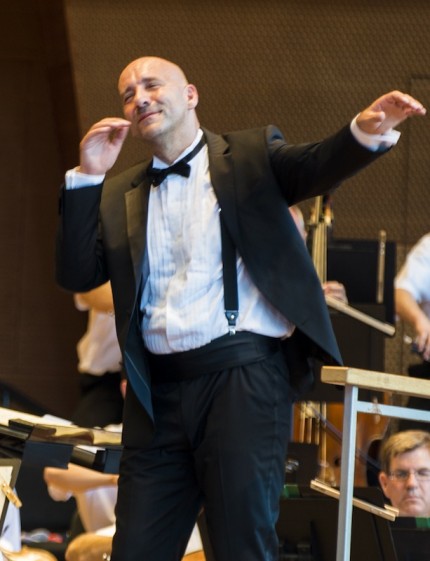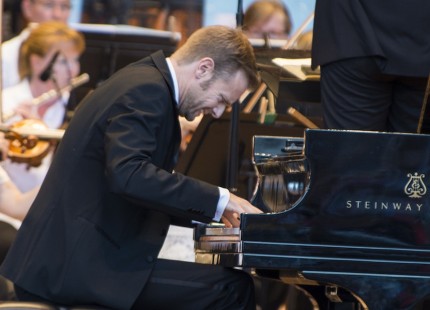Villaume, von Oeyen bring exhilarating élan to Grant Park travelogue

Emmanuel Villaume has been a semi-familiar face in Chicago, largely through his appearances at Lyric Opera, where he will return next March to lead performances of Gounod’s Romeo et Juliette.
Villaume returned to the Grant Park Music Festival Friday night after an absence of several seasons with a clever travelogue-y program that played to his strengths. The lineup included a French piano concerto, a symphony written in Paris by an Austrian composer and an Italian homage by a French composer.
The odd piece out was the opener, Franz von Suppe’s A Morning, Noon and Night in Vienna, though, here too, there is a sense of Offenbach’s Gallic esprit. Sans baton, the tall, kinetic French conductor led a fiery, exhilarating performance, drawing a rich, layered sonority from the Grant Park Orchestra and igniting a dervish frenzy in his lightning tempo for the final section. Principal cellist Walter Haman floated a beautiful, echt-Viennese solo in the central lyrical melody.
Mozart’s trip to Paris turned personally tragic with the sudden death of his mother, but the young composer garnered great acclaim in the City of Light, in large part due to the success of his “Paris” symphony (No. 31) written for the occasion. Mozart was delighted at being able to write for a larger orchestra than was usually at his disposal in Vienna, reflected in the brilliant outer movements of his concise symphony.
Villaume directed a spirited, rather muscular reading, again sparking the players to fizzing dynamism in the finale. The conductor opted for the original slow movement–Mozart wrote a lighter one at the request of a Paris promoter– and the Grant Park players offered an elegant rendering of Mozart’s graceful modulations.
Making his lakefront debut Friday was Andrew von Oeyen, soloist in Saint-Saëns’ Piano Concerto No. 2.
The Dutch-German pianist clearly possesses a stellar technique. Von Oeyen brought apt dark eloquence to the Bachian opening cadenza and cruised through the bravura pages with strongly projected tone and precise articulation.
Less evident was a sense of fantasy in the opening Andante and an essential wit and Gallic charm in the playful middle movement, which could have used a lighter touch. The pianist was off to the races in the Presto finale, at times sacrificing clarity in the process (intermittent static from a left-side speaker didn’t help). But, with Villaume and the orchestra lending equally high-powered support, this was an undeniably exciting performance and impressive debut for the slender young pianist who received a roaring ovation from a revved-up Grant Park audience.
Bizet’s Symphony No. 1 is a regular concert-hall visitor but its successor, Roma, is a genuine obscurity. Like many composers before and after him, Bizet was enchanted by his first visit to Italy after winning the Prix de Rome and his Second Symphony is a musical souvenir of sorts from that residency.
Roma lacks the youthful charm and effervescent spirit of the composer’s First Symphony. Still, as one might expect from the composer of Carmen, there is ample melodic richness, as with the broad opening theme for horns and the sweet-sad melancholy of the Andante. (The galumphing tune from the first movement sounds like Paul Dukas swiped it for his Sorcerer’s Apprentice two decades later.)
Ultimately, Roma adds up to less than the sum of its parts, but it’s an attractive, smartly scored work that surely deserves more than its current neglect.
Villaume clearly believes in it and led a superb performance. The conductor and orchestra brought bristling fervor to the stormy agitato section of the opening section, buoyant charm to the gamboling scherzo and a flowing, affecting lyricism to the slow movement. The finale’s tarantella theme is not among Bizet’s most indelible inspirations yet Villaume built the insistent dance motif to an exhilarating coda.
The program will be repeated 7:30 p.m. Saturday. gpmf.org
Posted in Performances






